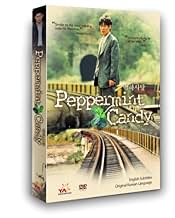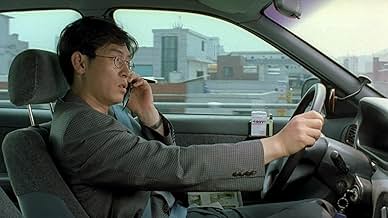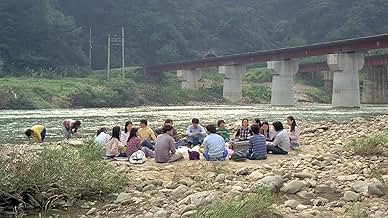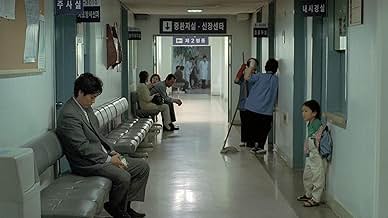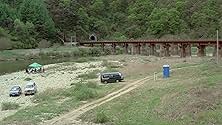AVALIAÇÃO DA IMDb
7,6/10
12 mil
SUA AVALIAÇÃO
Consiste das cinco fases da vida de um homem e sobre seu motivo para ter cometido suicídio no final.Consiste das cinco fases da vida de um homem e sobre seu motivo para ter cometido suicídio no final.Consiste das cinco fases da vida de um homem e sobre seu motivo para ter cometido suicídio no final.
- Prêmios
- 18 vitórias e 6 indicações no total
Ko Seo-hie
- Kyung-ah
- (as Seo-hie Ko)
Park Ji-yeon
- Female student
- (as Ji-Yeon Park)
Kim Kyeong-ik
- Myung-sik
- (as Kim Gyeong-ik)
Jeong Woo-hyeok
- Corporal Park
- (as Woo-hyeok Jeong)
Bae Jang-soo
- Camera shop owner
- (as Jang-soo Bae)
Avaliações em destaque
A young man is drafted into South Korea's army, where he is forced to suppress student demonstrations. A stint in the police has him beating confessions out of suspects. Upon leaving the cop job, this wrecked, embittered soul fails as a businessman and a husband.
All of this is contrasted with the hero as a young and naive man who will never imagine what he will be made to become by a brutal, corrupt "system".
A very solid 8/10.
All of this is contrasted with the hero as a young and naive man who will never imagine what he will be made to become by a brutal, corrupt "system".
A very solid 8/10.
At the beginning and at the end of the film I did not like his character and his horrible nature. but a good story. at the beginning of the storyline presented by people who are very depressed and suicidal, we will be presented with a flow of flasback back to the steps of the past, step by step from various character changes and behavioral conditions experienced.
I was curious that I read on the internet this film raised the issue of tragic events in 1980 (Gwangju Murder) through individual figures. Through this film, the director seems to want to illustrate the dramatic effect of the cruel event, the victims were not only civilians, but also "perpetrators", soldiers who had just carried out orders.
we can be prejudiced about this film but we can reflect on life that someone's future that might be destroyed can also be formed by a dark past.
Lee Chang-dong's second feature film is a lot more ambitious than his debut Green Fish. It presents a story unfolding in reverse chronology spanning several years before a man's suicide. The narrative is split between different parts with time gaps in between, connected by the movement of a train going back in time.
This film has some really great moments in it, but as a collective piece, it doesn't work as well as I wanted it to. I keep coming back to it hoping I find some new meaning to it, but my original opinion still hasn't changed. So let me go through everything that I didn't like about this movie, and then I'll move onto what I did like about it.
First off, I find the intro really annoying. It mostly has to do with the main character's obnoxious acting, but the silly characters surrounding him don't help much either. I don't claim to know anything about suicide, but I personally found it to be way over the top, especially coming from a director like Lee Chang-dong, who usually directs his films with incredible nuance and subtlety.
Throughout the whole movie I was asking "what is wrong with this guy" and clearly director Lee wanted me to be asking that so that the reveal at the end resonates with me emotionally. Unfortunately it didn't. I still sit there confused during rewatches, watching a lot of these scenes. It seems a little reductive to have a person's life be explained/justified by a single moment.
And my final big complaint is that there are no well written characters surrounding the protagonist. The big time skips between the segments make certain characters seem unrecognisable, and as a result they feel shallow, only used as narrative tools to hit certain plot points or references necessary for the main character's development.
On the bright side however, I really enjoyed certain parts of the story. Especially "Life is Beautiful" I thought was really well done, and managed to capture the complex emotions that Young-ho was feeling perfectly. The scene in the car driving back home is probably my favourite moment in the whole film. It says so much while doing so little.
Also I thought the callbacks were pretty well done throughout the film. That way the film maintains a through line that keeps the parts connected, and prevents the story from feeling too disjointed. The execution of the references isn't always the best, but it's at least serviceable, and it makes you remember important moments in the film.
In general I'm very conflicted about this film. I wanted to like it a lot more than I did, because there are some really interesting moments in this story. But in the end, it didn't impact me as much as Lee's other films did. But it's still a good movie, and I still enjoyed it, despite all of my problems with it.
This film has some really great moments in it, but as a collective piece, it doesn't work as well as I wanted it to. I keep coming back to it hoping I find some new meaning to it, but my original opinion still hasn't changed. So let me go through everything that I didn't like about this movie, and then I'll move onto what I did like about it.
First off, I find the intro really annoying. It mostly has to do with the main character's obnoxious acting, but the silly characters surrounding him don't help much either. I don't claim to know anything about suicide, but I personally found it to be way over the top, especially coming from a director like Lee Chang-dong, who usually directs his films with incredible nuance and subtlety.
Throughout the whole movie I was asking "what is wrong with this guy" and clearly director Lee wanted me to be asking that so that the reveal at the end resonates with me emotionally. Unfortunately it didn't. I still sit there confused during rewatches, watching a lot of these scenes. It seems a little reductive to have a person's life be explained/justified by a single moment.
And my final big complaint is that there are no well written characters surrounding the protagonist. The big time skips between the segments make certain characters seem unrecognisable, and as a result they feel shallow, only used as narrative tools to hit certain plot points or references necessary for the main character's development.
On the bright side however, I really enjoyed certain parts of the story. Especially "Life is Beautiful" I thought was really well done, and managed to capture the complex emotions that Young-ho was feeling perfectly. The scene in the car driving back home is probably my favourite moment in the whole film. It says so much while doing so little.
Also I thought the callbacks were pretty well done throughout the film. That way the film maintains a through line that keeps the parts connected, and prevents the story from feeling too disjointed. The execution of the references isn't always the best, but it's at least serviceable, and it makes you remember important moments in the film.
In general I'm very conflicted about this film. I wanted to like it a lot more than I did, because there are some really interesting moments in this story. But in the end, it didn't impact me as much as Lee's other films did. But it's still a good movie, and I still enjoyed it, despite all of my problems with it.
A smart film! We get to follow a man back in time (in the "wrong" chronological order!?). At first he seems to be a cruel, evil and bitter man. But the further back in time the film takes us we get another picture. A picture of how an ordinary nice guy turns in to a sadistic man by the "system". Maybe the film makers wants us to see that no man is born evil.
I was really impressed by the plot line of this film. I first wonder why he has to die and why he is so destructive. Then the plot goes reverse into the past while it untangles the mystery why he became that reckless. Chronologically placed scenes are bound together with one key 'peppermint candy'.
Kyung-gu Sol really plays the roll well. He plays it not just as a violent, but solitary and vulnerable man. Through his exquisite acting, we learn his character and even historical background. Without him, this film would be a husk.
Kyung-gu Sol really plays the roll well. He plays it not just as a violent, but solitary and vulnerable man. Through his exquisite acting, we learn his character and even historical background. Without him, this film would be a husk.
Você sabia?
- CuriosidadesSeo-hie Ko's debut.
- ConexõesReferenced in Making Memories of Murder (2004)
- Trilhas sonorasCatch the Rainbow
Written & Performed by Ritchie Blackmore and Ronnie James Dio
(Blackmore and Dio are member of Rainbow)
Principais escolhas
Faça login para avaliar e ver a lista de recomendações personalizadas
- How long is Peppermint Candy?Fornecido pela Alexa
Detalhes
- Data de lançamento
- Países de origem
- Central de atendimento oficial
- Idioma
- Também conhecido como
- Peppermint Candy
- Empresas de produção
- Consulte mais créditos da empresa na IMDbPro
Bilheteria
- Faturamento bruto mundial
- US$ 89.184
Contribua para esta página
Sugerir uma alteração ou adicionar conteúdo ausente

Principal brecha
By what name was Doce de Menta (1999) officially released in Canada in French?
Responda


